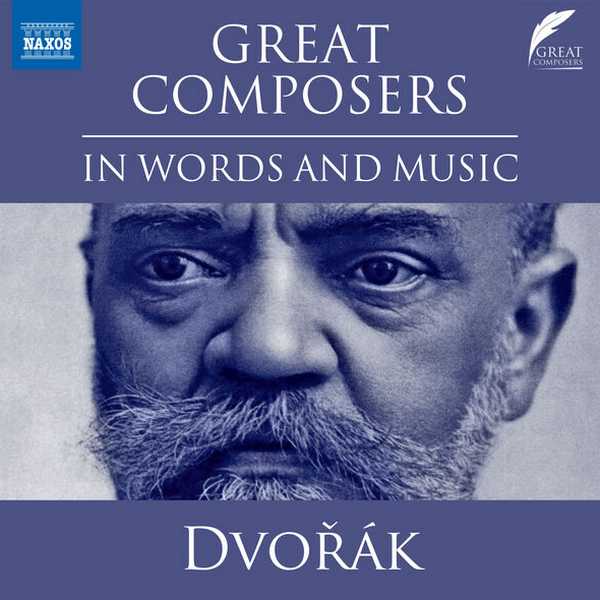
Composer: Antonín Dvořák, Louis Spohr
Performer: Nicholas Boulton, Davinia Caddy
Format: FLAC (tracks)
Label: Naxos
Catalogue: 8578368
Release: 2023
Size: 227 MB
Recovery: +3%
Scan: yes
01. Caddy: Introduction
Dvořák: Slavonic Dances, Op. 72, B. 147 (Version for Orchestra)
02. No. 1 in B Major
03. Caddy: Bits and pieces are all we may know about the music of Antonín Dvořák
Dvořák: 10 Biblical Songs, Op. 99, B. 185
04. No. 4, Hospodin jest můj pastýř
05. Caddy: The fourth of Dvořák’s Ten Biblical Songs, titled “The Lord is my shepherd” and set to a well-known Psalm text from the traditional Czech translation of the Kralice Bible
Dvořák: 10 Biblical Songs, Op. 99, B. 185
06. No. 6, Slyš, ó Bože, volání mé
07. Caddy: Antonín Leopold Dvořák was born on 8 September 1841 in the village of Nelahozeves, near Kralupy, in Bohemia, approximately 28km north of Prague
Spohr: Symphony No. 6 in G Major, Op. 116 “Historische Symphonie im Styl und Geschmack vier verschiedener Zeitabschnitte”
08. IV. Allerneueste Periode, 1840. Allegro vivace
09. Caddy: Reflecting on this period of the composer’s life, Zubatý (the Czech writer mentioned previously) wrote…
Dvořák: Symphony No. 1 in C Minor, B. 9 “The Bells of Zlonice”
10. II. Adagio molto
11. Caddy: Dvořák’s first symphony, composed between February and March 1865, began life as a submission to a German composition competition…
Dvořák: Symphony No. 1 in C Minor, B. 9 “The Bells of Zlonice”
12. I. Maestoso – Allegro
13. Caddy: In early 1865, Dvořák started teaching piano to the daughters of a Prague goldsmith: one of the two, Anna Čermáková would later become his wife…
Dvořák: String Quartet No. 4 in E Minor, B. 19
14. I. Assai con moto ed energico
15. Caddy: Before he left the Provisional Theatre orchestra in the summer of 1871, Dvořák was the subject of an announcement in a leading local music journal
Dvořák: Král a uhlíř, B. 21, Act I Scene 9
16. Jaký zvuk to jest?
17. Caddy: It seems that Dvořák’s revision of the opera between 1873 and 1874 was but part of a larger stylistic renovation being undertaken by the composer at the time
Dvořák: Moravské dvojzpěvy, Op. 32, B. 62
18. No. 2, Veleť vtáčku
19. Caddy: In response to Dvořák’s multi-composition submission for the 1877 stipendium, Brahms singled out the Moravian Duets for special praise
Dvořák: Slavonic Dances, Op. 46, B. 83
20. No. 1 in C Major
21. Caddy: While this style of music might be regarded, somewhat cynically, as a kind of opportunistic “tourist nationalism” (to quote a recent historian), listeners in Dvořák’s time thought the very opposite…
Dvořák: Piano Trio No. 3 in F Minor, Op. 65, B. 130
22. I. Allegro ma non troppo
23. Caddy: In August 1883, Dvořák received a prestigious invitation: the London Philharmonic Society requested his presence as conductor (of his own orchestral works) in their forthcoming concert season
Dvořák: Stabat Mater, Op. 58, B. 71 (1876 Version)
24. Stabat mater dolorosa
25. Caddy: Dvořák left Prague for London on 5 March 1884: eight days later he was conducting the Stabat Mater in the Royal Albert Hall
Dvořák: Piano Trio No. 4 in E Minor, Op. 90, B. 166 “Dumky”
26. I. Lento maestoso – Allegro vivace, quasi doppio movimento – Tempo I
27. Caddy: In 1891, the same year Dvořák completed the “Dumky” Trio, he took up the position of professor of composition and instrumentation at the Prague Conservatory
Dvořák: Te Deum, Op. 103, B. 176
28. Te Deum laudamus
Caddy: The premiere of the Te Deum within the celebratory concert, which took place on 21 October 1892 at New York’s Carnegie Hall, was preceded by a concert address by the 29. American musical patron…
Dvořák: Symphony No. 9 in E Minor, Op. 95, B. 178 “From the New World”
30. III. Scherzo. Molto vivace
31. Caddy: Following the premiere of his Ninth Symphony, Dvořák may well have looked forward to a prosperous and productive period in New York
Dvořák: Cello Concerto in B Minor, Op. 104, B. 191
32. III. Finale. Andante – Allegro vivo
33. Caddy: The next – and, indeed, the penultimate – phase in Dvořák’s compositional journey seems to have emerged from his previous interest in music’s extra-musical associations…
34. Dvořák: The Water Goblin, Op. 107, B. 195
35. Caddy: During his final years, Dvořák became the recipient of various honours…
Dvořák: Armida, Op. 115, B. 206, Act I Scene 1
36. Jak z dervišových prstů řinou
37. Caddy: Dvořák is said to have departed the theatre early on the evening of 25 March 1904, during the premiere of Armida at the National Theatre in Prague…
38. Dvořák: Hymnus ad laudes in festo Sanctae Trinitatis, B. 82
The music of Bohemian composer Antonín Dvorák is suffused with natural nobility, fluency and freshness, and embodies the spirit of his native land. This revealing biography portrays Dvorák as a complex and wide-ranging composer, and explores the creation and performance of his music as well as its reception on both sides of the Atlantic, tracing his art in all its richness and variety. Musical excerpts include the Cello Concerto, the ‘New World’ Symphony and the Slavonic Dances, as well as selected chamber pieces, songs, opera excerpts, and narrated by Nicholas Boulton.